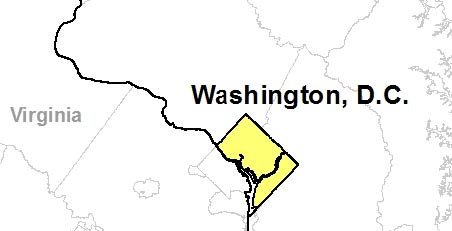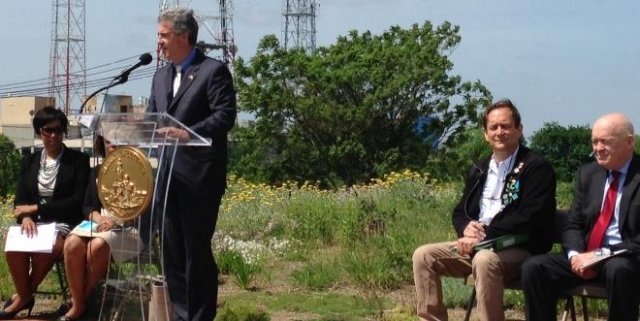Green Infrastructure in the Mix to Reduce District of Columbia Sewer Overflows
Stories of Progress in Achieving Healthy Waters
U.S. EPA Region 3 Water Protection Division
Washington, D.C. • May 21, 2015
The District of Columbia’s Long Term Control Plan to keep sewage out of the city’s rivers and creeks is being modified to include a substantial greening component for the first time, making it a dominant feature of two of the three drainage areas of the combined sewer system in the nation’s capital.
The modification gives DC Water the go-ahead to pursue an integrated green/gray infrastructure approach to address the stormwater- and sewage-driven water quality issues in the Rock Creek and Potomac watersheds. Green infrastructure uses vegetation, soils, and natural processes that mimic nature to soak up and store stormwater where it falls to control wet weather pollution and create healthier urban environments.
The large-scale green infrastructure projects are scheduled to begin in 2015 and 2016 respectively, providing more immediate pollution reductions, enhancements to community livability, green jobs opportunities, and a sustainable model for other communities to follow.
Under the modified consent decree, DC Water will continue to churn ahead – literally – on the most significant aspect of the overall Clean Rivers program to control combined sewer overflows (CSOs) – construction of two tunnel systems and related projects to capture and provide storage for CSOs discharged in the Anacostia and Potomac watersheds. The Anacostia tunnel systems are being carved by giant boring machines, Lady Bird, Nellie and Lucy, that even have their own Twitter accounts . When the Anacostia tunnel complex is fully completed in 2025, it will nearly eliminate CSOs to the Anacostia River in an average rainfall year.
For the Rock Creek and Potomac watersheds, there will be more than tunnel vision at work. Specifically, the agreement calls for:
- Using green infrastructure to retain 1.2 inches of rainwater on 365 acres in the Rock Creek area, and 133 acres in the Potomac watershed.
- Potentially eliminating the Rock Creek storage tunnel and significantly decreasing the size of the Potomac tunnel depending upon the success demonstrated by green infrastructure.
The modification, agreed to by EPA, DC Water and the District, also includes construction of an enhanced clarification unit, optimization of process flows, and tunnel enhancements. The changes are designed to ensure that the Blue Plains Advanced Wastewater Treatment Plant nutrient reduction system can achieve “limit of technology” reductions in 2018.

-
Green Infrastructure in the Mix To Reduce District of Columbia Sewer Overflows (pdf)
(628.26 KB, 05/21/2015)
The District of Columbia’s Long Term Control Plan to keep sewage out of the city’s rivers and creeks is being modified to include a substantial greening component for the first time, making it a dominant feature of two of the three drainage areas of the combined sewer system in the nation’s capital.

AT A GLANCE
-
EPA, DC Water, District of Columbia agree to include major greening component in long-term plan to keep sewage out of the city’s rivers and creeks.
For additional information, contact:
Steve Maslowski
Office of NPDES Permits and Enforcement
U.S. Environmental Protection Agency
Region 3 Water Protection Division
1650 Arch Street
Philadelphia, PA 19103
maslowski.steven@epa.gov
